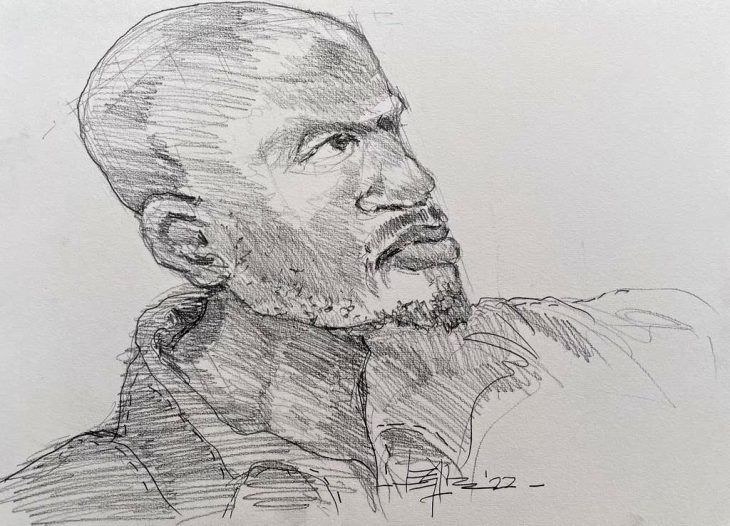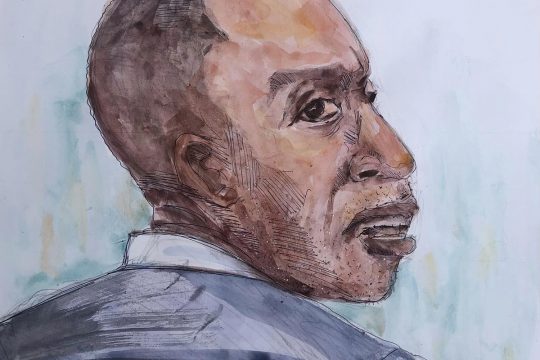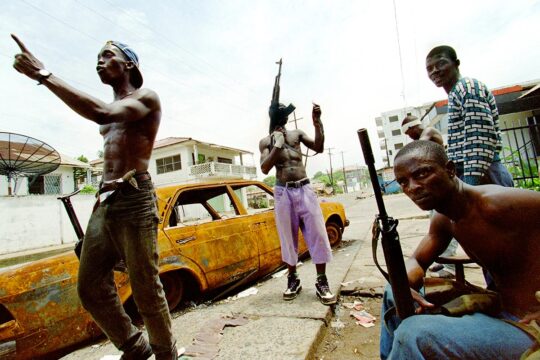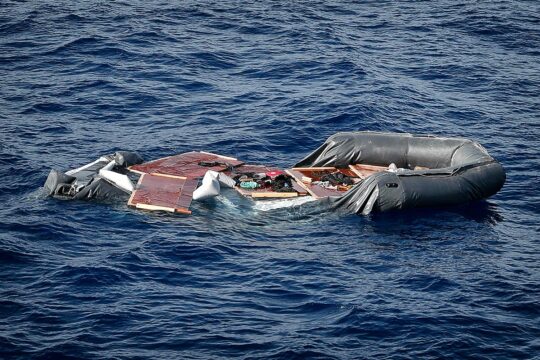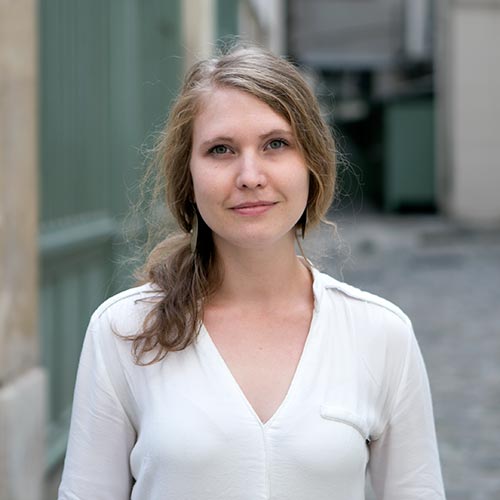"Of course, extraordinary crimes can be committed by ordinary people. But not everyone is destined to become a war criminal," said prosecutor Aurélie Belliot. “One retains one's free will." Speaking on Monday, October 31, she asked for a life sentence against Kunti Kamara. This former commander of the United Liberation Movement of Liberia for Democracy (ULIMO) was accused of "aggravated acts of torture and barbarism" and "complicity in crimes against humanity”. In 1993 and 1994, in the midst of Liberia's civil war, Kamara was alleged to have committed multiple acts of violence in and around the town of Foya, during his armed group's bloody occupation of Lofa County in northern Liberia.
Kamara has been on trial since October 10 in Paris, under universal jurisdiction, which allows French justice to judge international crimes committed outside the country, and by non-nationals. On the morning of November 2, the accused had one last opportunity to speak before the Assize Court in Paris. It lasted 30 seconds. "I have nothing to say except that I am innocent today, I will be innocent tomorrow. I was a simple soldier," he said.
That same evening, the court found him guilty on all counts, sentencing him to life in prison.
Rape as a crime against humanity
Lofa is a county where "time seems to have stood still" for the past 30 years, explained the public prosecutor in her indictment. She was referring to the ruins of the Foya power station, which was never rebuilt after being ripped apart by ULIMO in 1993, its generator carried away during one of the notorious forced marches. These marches, true "acts of torture" in which the inhabitants were requisitioned by force, are among the crimes of which Kamara was accused.
But it was because he allegedly condoned the multiple rapes of two women by his subordinates that Kamara was also prosecuted for "complicity in acts of torture constituting crimes against humanity”. Unlike the other crimes of which Kamara is accused, which date back to 1993, these acts allegedly took place after March 1, 1994, the date on which crimes against humanity became part of French criminal law. The prosecution said no one could deny the widespread, systematic and massive character of the rape and sexual slavery of Lofa’s women when the county was under ULIMO control. These rapes were therefore part of a context and a strategy of global terror against the civilian population. But in 1994, rape was not considered to constitute a crime against humanity. The qualification retained is therefore "acts of torture constituting crimes against humanity". The defence denounced this as "legal acrobatics", but the prosecution maintained it was a reality. On October 25, witness Esther N. collapsed in the courtroom racked with pain as she was recounting what she had suffered at the hands of "Babylon", who was allegedly one of Kamara's bodyguards. Emergency staff had to intervene, permanently ending her hearing. In its judgment, the court deemed that these rapes fell into the most serious category of crimes: crimes against humanity.
Testimonial evidence
The first civil war in Liberia was a time of horror and chaos, said prosecutor Belliot, and the first victims were civilians. "Life was a matter of chance," she said. In Lofa, she told the court, the horror was organized. "ULIMO had the region under control, using terror as a mode of governance: public executions, cannibalism, forced labour, torture, rape and sexual slavery...” This horror was recounted at length by 12 witnesses and eight civil parties in the three weeks of hearings. They formally recognized Kunti Kamara as one of the perpetrators.
In a case that is almost 30 years old, "the trial is being held thanks to the words of the victims, because the evidence is scarce," acknowledged Sabrina Delattre, the civil parties' lawyer, on October 28. But these "concordant" testimonies corroborated each other, she believes, painting "a very precise” picture the facts.
"Testimony is not inferior evidence," said prosecutor Claire Thouault in her closing remarks. Certainly, there is very little material evidence, "but to demand it, as the defence did, is to deny the context and reinforce the impunity of perpetrators of this type of crime", she continued, saying that trials of major international crimes - committed years or even decades earlier in the chaotic context of war - are almost always based entirely on testimonial evidence.
It was precisely this that the lawyer for the accused, Maryline Secci, wanted to denounce. “Sometimes the accusation is based on only one direct witness," she exclaimed. “This would be worth almost nothing in a common law case, so why accept it in this case?” Turning to the jury, she told them: "You are being asked to rely on a handful of witnesses to convict someone of the maximum sentence." She said that because the prosecution's case was so lacking in physical evidence, "they wanted to put this testimony on a pedestal, but you don't fill holes with holes! If it was you in the [defendant's] box, you wouldn't be satisfied with that.
"Not once in these proceedings has the possibility been raised that after so much time witnesses may be mistaken when they say they recognize Mr. Kamara," she continued, or that their "need for justice" is such that they accuse the man they are presented with, "for fear that if they do not, no one will listen to them". “Our position is not to say that nothing happened in Liberia, but that Mr. Kamara did not commit these crimes," said the lawyer. “Remember that reasonable doubt should benefit the accused.”
“Unfair” trial
Secci denounced what she called an "unfair" trial stacked against the accused. "France wants to do international justice without giving itself the means," she said, recalling that no additional funding had been granted to the defence in this case involving decades-old events that took place more than 5,000 kilometres away. "In this trial presented as historic, the defence was given resources as if for a common law case. As a result, she told the jury, "you have been presented with a case only from the prosecution's side”.
Even during the hearings, Secci believes Kamara did not benefit from the presumption of innocence to which he is entitled. "I could observe that when my client spoke, everyone tensed up," she continued, saying his sentences were cut off, there were translation problems, misunderstandings, annoyance when his answers were evasive or not pertinent. "More was demanded of him than of the witnesses. The prosecution kept asking him 'why, if you are innocent, are so many people accusing you?’ But it is not up to him to explain himself and what could he have said? We can give him the floor, but if you consider from the outset that his word is worth less than that of the witnesses and civil parties, it is because you already consider him guilty."
She said no one had sought to really listen to her client who "does not have the codes of our society”. Secci thus questioned the legitimacy of this trial. "While the goal of universal jurisdiction is commendable, we are faced with an extremely complex context and our own ignorance. No one here has a true understanding of what the civil war in Liberia was like. We are looking at this through our own cultural prisms and that is problematic.”
Blanket denial
"It is not a question of judging in Liberia’s place, but in the absence of trials there,” prosecutor Claire Touault had said a few hours earlier. "Impunity still reigns in Liberia. The victims have to continue living alongside their torturers. So, while we wait for that country to choose justice over impunity, the expectations of the victims oblige us to act,” continued deputy prosecutor Belliot. “And France cannot become a refuge for these criminals."
“The crimes [of which Kunti Kamara is accused] are the most serious," she insisted. “By their extreme barbarity, they undermine all of humanity.” She told the jury that while they owed it to victims to fight impunity, they must also take Kunti Kamara’s personal responsibility into account. She recalled that throughout the trial, the former rebel commander not only denied any responsibility for the crimes, claiming he was at the time on the front lines several kilometres from Foya town, but he also denied having witnessed any form of violence. "They would have us believe that Mr. Kamara lived in Liberia, that he was in Lofa County during the first civil war and never saw any abuses committed against a civilian,” she said. “This blanket denial has to be questioned." Perhaps this helped to convince the jurors of the defendant's guilt.


